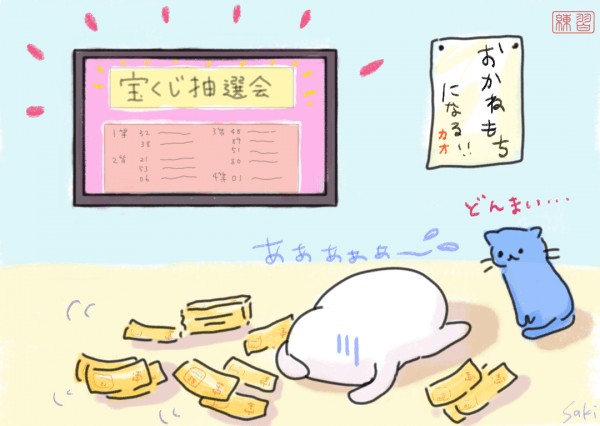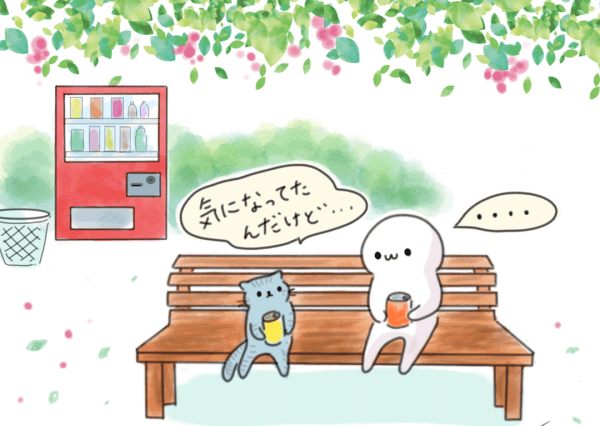
又チャンスが有るから、諦めないで!
You'll have another chance, so don't give up!
41
学生時代は、お金が無かったから、旅行に行けませんでした。今は、お金が有るけど、時間が無いから、行けません。
I couldn't go traveling when I was a student because I didn't have any money. Now, I have money, but I don't have any time.
0
27
妻の手料理は美味しいから、つい食べ過ぎて仕舞います。
Since my wife's home cooking is so delicious, I eat too much without realizing it.
0
27
日本のアニメのフィギュアを集めてるけど、高いから中々買えません。
I'm collecting Japanese anime figures, but they're expensive so I can't really buy them.
0
10
彼は、成功したベンチャービジネスの社長だから、凄い金持ちに違いない。
He must be super rich because he runs a successful venture business company.
0
35
色いろ便利だから、都心に住みたいです。
I want to live downtown because it's convenient in a lot of ways.
0
18
分かり難い文章だ。句読点が抜けてるからだ。
This passage is difficult to understand because the punctuation marks are missing.
0
11
「此の下書きでいいから、清書為なさい。」
This draft is fine, so please make a clean copy of it.
0
4
いい天気だから窓を開けてもいいですか。
Since the weather is so good, can I open a window?
0
11
今日は暖かいから、火は要らない。
Because it is warm today, a fire is not necessary.
0
15
此の機械は迚も危険だから触るな。
This machine is most dangerous; don't touch it.
0
Getting the sentences
Construction
(Elements in parentheses are optional.)
Basic Examples:
行くから (because (I'm) going)
Basic Examples:
美味しいから (because (it's) tasty)
Basic Examples:
先生だから (because (he's) a teacher)
Basic Examples:
不潔だから (because it's unsanitary)
Where this grammar is found
Advanced notes
一
When compared to ので, から is much more direct in giving the reason or cause. Because of this, it is good to avoid から and use the less direct ので when the reason/cause might offend the other party.
頭が痛かったから、仕事を休みました。(wrong)
頭が痛かったので、仕事を休みました。(fixed)
I didn't go to work because my head hurt.
The first sentences could come across as arrogant or as if you take your request for granted, so it's helpful to use ので when making a request/excuse.
Grammar usage notes
While the statements in the advanced notes are quite correct, keep in mind that ので is a more formal and polite form of から. When speaking in colloquial Japanese (だ instead of です), it's better to use から otherwise you'll end up mixing levels of politeness.
ので is also almost always used in place of から in formal writing, and can be used in the だ or である writing styles.
ので is also almost always used in place of から in formal writing, and can be used in the だ or である writing styles.
When you were asked, から(だ/です)is tend to be used for giving direct answer of the question.
Ex:
A 「なんでパーティーにこなかった?」
B 「仕事をまだ終わらなかったからです。」
It's possible to say something like: あなたのことが好きだからです、大雨だからだ、大雪だから*だ*と思う、etc.
Ex:
A 「なんでパーティーにこなかった?」
B 「仕事をまだ終わらなかったからです。」
It's possible to say something like: あなたのことが好きだからです、大雨だからだ、大雪だから*だ*と思う、etc.
Questions/Discussion
Wouldn’t いつも忙しいが今日は休みなさい also make sense? Wouldn’t it translate to “you’re always busy, but take today off”?
From A, Since A
Marks the source (time or place) A where an action began.
- Because A
- From A, Since A Marks the source (time or place) A where an action began.

君は何処から来ましたか?
Where did you come from?
2
昨日から雪が降って居ます。
It's been snowing since yesterday.
0
4
駅から歩いて帰ります。
I'll walk home from the station.
0
3
教科書の30頁から始めましょう。
Let's begin from page 30.
0
41
七月1日から仕事を始めます。
I will start working on July 1.
0
13
お祖母さんはバスから降りた。
The old lady got down from the bus.
0
15
此の漫画は彼の姉から借りました。
I borrowed this comic book from his older sister.
4
8
誰かが私を後ろから捕まえた。
Someone grabbed me from behind.
0
7
フォークがテーブルから落ちた。
A fork fell off the table.
0
3
一昨日から、雨が降ったり止んだり為て居る。
It has been raining on and off since the day before yesterday.
0
9
駅は此処から遠くない。
The station is not far from here.
0
10
夏休みは七月から始まる。
The summer vacation begins in July.
0
0
火曜日から雨が降り続けて居る。
It has been raining since Tuesday.
0
2
子供がベッドから落ちた。
The boy fell off the bed.
0
Getting the sentences
Construction
(Elements in parentheses are optional.)
Basic Examples:
母から貰う (from mother)
朝から (since morning)
Where this grammar is found
Grammar usage notes
に can also be used instead of から with もらう/いただく
can also be used to indicate place or time that something/someone came from.
Questions/Discussion
Nothing posted yet!
